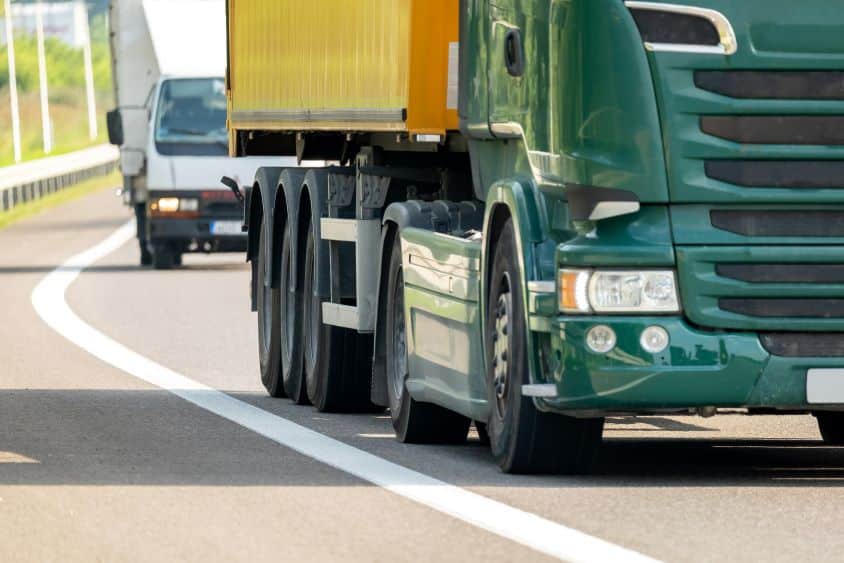HGV driver shortages: why is the UK struggling?
Written by: Simon Pavey, Last updated:28th April 2023

In recent years, the haulage industry has seen staff numbers drop by nearly 17%. Combined with other elements of a turbulent landscape, including navigating a post-COVID and post-Brexit market, and the impacts of the Russia-Ukraine conflict, the HGV driver shortage is leaving supply chains around the country under immense pressure.
Why is there a shortage of lorry drivers?
Such a significant drop in qualified HGV drivers in the last four years, estimated to be at least 76,000, is indicative of a number of challenges within the industry, including the age of the haulage workforce and the demanding nature of the jobs with insufficient compensation.
Aging workforce
One of the biggest hurdles haulage faces is the fact that the average age of hauliers is only increasing. With nearly 50% of HGV drivers in the UK aged over 50 years old, more and more of HGV fleet drivers are reaching retirement age. With an insufficient uptake of HGV roles in younger workers, the more HGV drivers we see leave the industry for retirement or other reasons, the thinner the workforce will become.
With fewer than 16% of the workforce aged 16-35, the disparities will only grow without proper measures taken to increase retention of those not at retirement age and increase uptake of HGV driver training by those starting their careers.
Physically and mentally demanding work
Haulage is a demanding industry and one that a career in will put significant pressure on ones body and mind. With working days frequently lasting longer than 9 hours, and the role requiring physical strength as well as the mental strength and resilience to remain focused while driving in isolation for hours and even days at a time.
The role of a HGV driver is not a social one, and for many the isolation of the job can get increasingly difficult as the years go on. Paired with the physical impacts of an often sedentary work life, a career as an HGV driver can have a lasting impact on mental and physical wellbeing.
In significantly male dominated industries, it’s also important for fleet managers to be aware of how culture impacts how wellbeing in all its forms is handled. Mental health and the open discussion of mental health difficulties is something that is still not widely undertaken, particularly in industries like haulage where the workforce is predominantly older men.
These are all factors that need to be carefully considered by haulage companies and trainers looking to reshape the industry to attract new talent and retain it.
How do we solve the HGV driver shortage?
With haulage playing such an essential role in the supply chain for business around the country, finding a solution to the driver shortage is one marked with urgency to prevent further disruption, but the solutions require some significant change from within the industry.
To attract new talent
Haulage companies need to rethink how the industry is marketed to potential new starters, in order to increase appeal and get people interested in training to be a HGV driver. This starts with quality training, increasing the availability of apprenticeships and improving rates of pay.
Inflation and the cost-of-living crisis in the UK have been hard hitting on individuals and businesses alike. With these economic challenges expected to last well into 2024, haulage companies need to consider how to persuade new starters that taking on this new and challenging roll will be a beneficial decision.
Additionally, investing in high quality and attentive training is what will give new starters their first impression of the industry, and will set them up with all the skills necessary to undertake the job confidently, safely and effectively. It’s also worth implementing training on mental health, wellbeing, and physical awareness to help foster a culture of care within the industry.
To retain talent
Staff retention is important both for new starters as well as those already working in the industry. To help limit the number of drivers choosing to leave the industry early, creating a positive working culture and ethos will help to demonstrate to all staff that the industry is a valuable and attentive on to work in.
Rewards programmes are a great way to incentivise workers, and continuous training can help to ensure that fleet drivers are always up to date on the knowledge and aware that their growth and development are being invested in.
Keeping an open dialogue is also a great way to demonstrate to staff that they are more than just industry tools. What this can mean for fleets is regular conversations about things the company does well and areas that could use improvement, as well as open communication about drivers personal experiences within the industry.
You can read our tips and tricks on attracting and retaining drivers for more insights.
What are the government doing to help the haulage industry?
There are a number of measures the government has put in place in recent years to help combat the HGV driver shortage, of which many were outlined in an open letter addressed to the UK Logistics Sector delivered off the back of the coronavirus lockdowns.
Firstly, the DVSA (Driver and Vehicle Standards Agency) increased the amount of testing through overtime and allocating additional staff. Successful passes then increased from 1,150 per week (pre-COVID) to 1,500. The DfT (Department for Transport) aims to increase this number to 2,000 by consulting about the “delegation of the off-road manoeuvres as part of the HGV driving test”.
Changes to provisional licenses could allow candidates to progress straight to the articulated lorry test without first having to pass the rigid lorry test.
Relaxed requirements are also being considered in relation to newer car license holders taking extra tests to drive car/van and trailer combinations. The hope is that this would free up more testing capacity for HGVs.
The government also increased funding to the Large Goods Vehicle Driver apprenticeship. This aims to tackle the huge issue of the barrier to entry for younger people. With an apprenticeship such as this, they will be more financially supported, making becoming a licensed driver a more realistic prospect.
This letter outlined further steps such as increasing support towards hiring, relaxation of driver’s hours rules and maximising retention.
The full letter can be read here.
Is the end of the HGV driver shortage in sight?
While the driver shortage is a tricky hurdle to handle for the haulage industry, there is hope for a resolution. Whilst the shortage still puts pressure on the supply chain for now, with dedicated efforts from haulage companies and trainers there is the potential for a positive shift in the industry that will see the an increase in haulage trainees and new starters and an improvement in retention of all staff.
HGV fleet managers should look to start making changes where possible to encourage a positive change in culture that will get the workforces growing.
HGV fleet fuelling with Fuel Card Services
While haulage fleet managers are dealing with the impacts of the driver shortage and the difficulties of a fluctuating fuel economy, one way to keep costs down and ease up on the admin is with the right fuel cards.
Fuel Card Services provide a range of fuel cards with a host of benefits that mean you can help to increase the efficiency of fleet fuelling and cost management, and reap benefits for your fleet along the way. You can browse our range of fuel cards here, or enquire today for support from our team of experts.
back



